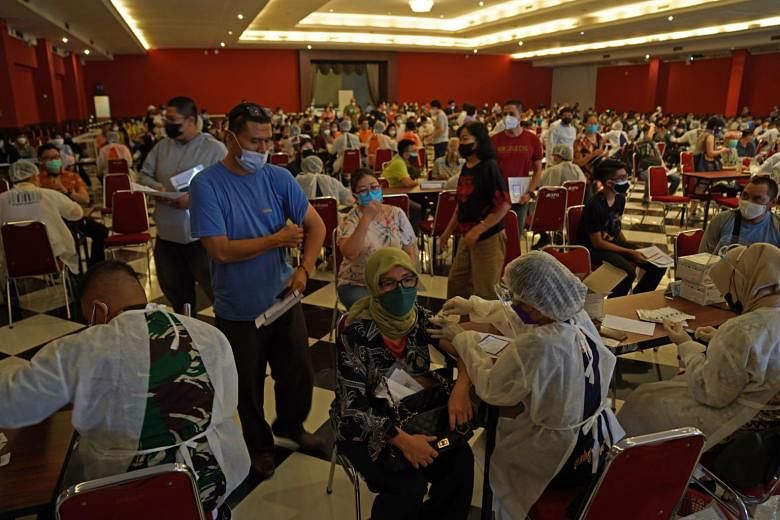JAKARTA - Indonesia has reported a fresh surge in Covid-19 cases, believed to be largely triggered by the less severe Omicron variant of the coronavirus.
On Friday (Jan 28), the country reported 9,905 new infections, the highest daily tally since August last year when the country struggled to cope with a wave of cases involving the more severe and deadly Delta strain. In July, the number of cases peaked at over 56,000 a day.
Jakarta reported the most cases on Friday, totalling 4,558 and it was followed by the neighbouring provinces of West Java and Banten with 2,313 and 1,754, respectively.
The number of people hospitalised has also gathered pace, rising from eight per cent on Jan 3 to 41 per cent on Thursday. West Java’s bed occupancy rate (BOR) was 16 per cent, while Banten’s was 11 per cent, in line with the national BOR.
President Joko Widodo on Friday called on those infected but not displaying symptoms to self-isolate for five days, and those with symptoms to use telemedicine services, visit a doctor or the nearest health community centre.
“Consequently the burden on health community centres and hospitals is reduced. It is important to allow our health facilities to focus more on handling patients with severe symptoms or those who have other diseases and require intensive care,” he said.
Indonesia reported its first Omicron case in mid-December, and the first deaths from the variant last week. The first fatality was a 54-year old woman who had just returned from the Netherlands. She was vaccinated. The second victim was a 64-year old man who was not vaccinated. Both had other underlying issues, including diabetes.
Health Minister Budi Gunadi Sadikin told a press conference on Thursday that he was optimistic the latest Covid-19 wave would be manageable as infections attributable to the Omicron variant were milder than others.
“The hospitalisation is low and the fatalities are also low. Most people infected by Omicron can be treated at home and self-isolating,” Mr Budi said.
But he noted that Omicron was highly transmissible, spreading “rapidly and massively”.
He projected that the current wave would peak at the end of February or early March, but he was confident that Indonesia would be able to expand its current hospital capacity of 80,000 beds to 130,000 if the situation worsens.
A spokesman for one of Jakarta’s main Covid-19 referral hospitals has confirmed that it has had to deal with a surge in Covid-19 patients since early January with 24 of its 38 isolation beds occupied.
There were only one or two patients, and even none in November and December, Dr Erlina Burhan, the spokesman for Persahabatan General Hospital, told The Straits Times.
When asked about the hospital's preparedness to face the latest wave, the pulmonologist said: “We are ready to increase our beds to 300 like in July and August when we handled the Delta (variant).”
“During Delta, it was very horrible. We accepted people who were severely sick. The mortality rate was high, and our oxygen was limited. Fifty to seventy patients queued at our emergency unit,” she said.
“We’ve experienced this. But we hope it won’t happen again,” Dr Erlina added.
Epidemiologist from Griffith University Dicky Budiman has warned that the threat should not not be underestimated.
"What we should do is to take strong and proper measures to respond to it,” he told ST. “In the short term, the burden of health facilities must be eased. Self-isolation is fine, but it is necessary to have an effective monitoring mechanism, such as through home visits.”
Indonesia reported 4.32 million Covid-19 cases in total and 144,268 deaths as of Friday.
Indonesia reported its first Omicron deaths last week. The victims were a woman who had just returned from the Netherlands and a man in South Tangerang, Banten.
It is unclear, however, how many new Covid-19 patients have lost their lives to the virus.
The country reported 20 Covid-19 deaths on Tuesday, the highest since Nov 12, 2021. The figure, however, fell to seven on Thursday, according to government data.
Mr Budi said that the government would ensure that only those with moderate and severe symptoms would be hospitalised and that it would prioritise vulnerable people - the elderly, those with immunodeficiency and those who have yet to be vaccinated.
Furthermore, he added, the government was still able to increase the number of hospital beds from 80,000 to 130,000, if deemed necessary.
The minister argued that for Omicron it was important to focus the national pandemic strategy on the hospitalisation rates.
"Going forward, we will focus our strategy based on hospitalisation figures. Even if daily Covid-19 cases are now around 7,000, we will take into consideration how many of those are hospitalised," he said.
Dr Zubairi Djoerban, the head of the Covid-19 task force at the Indonesian Medical Association (IDI), has called on the government to suspend in-person learning and raise the level of the public activity restrictions (PPKM), which currently remains at Level 2.
"With daily infection cases soaring past 7,000 and the positivity rate going past 10 percent, these are indicators that in-person learning is no longer safe," Dr Zubairi wrote on his Twitter account on Wednesday. "Please consider calls to cancel the 100 per cent in-person learning and raise the public activity restrictions level."
While the government might be looking to allocate hospital beds to Covid-19 patients with severe symptoms going forward, Dr Masdalina Pane of the Indonesian Epidemiologists Association (PAEI) said that some people might have little option but to isolate themselves in hospitals, even with mild symptoms, because their houses are not suitable for independent isolation.
She urged the government to mobilise neighbourhood unit (RT) Covid-19 task forces to provide isolation centres, particularly for densely packed neighbourhoods, in collaboration with Puskesmas (community health centres).
"These local task forces can repurpose unused buildings as independent isolation centres, with medical supervision from the medical workers at local Puskesmas. This way, people with only mild symptoms will not drive up the country's BOR figures," she told The Jakarta Post on Thursday.












